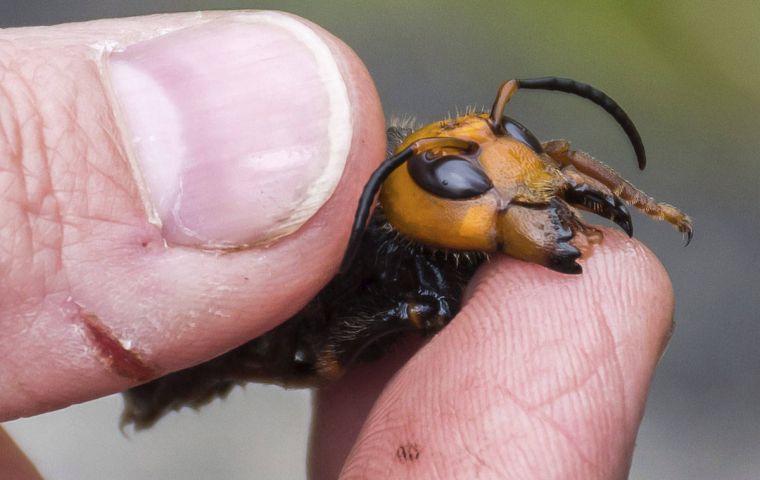MercoPress. South Atlantic News Agency
US West Coast bees threatened by the predatory Asian giant “murder hornet”
 The stinging Vespa mandarinia can grow as large as 6.35cm in length and is native to South-east Asia, China and Taiwan
The stinging Vespa mandarinia can grow as large as 6.35cm in length and is native to South-east Asia, China and Taiwan Hundreds of Asian giant hornets – an invasive, predatory insect dubbed the “murder hornet” – have turned up in Washington state near the Canadian border, where they pose a threat to humans and the beekeeping industry, state agriculture officials said.
The stinging Vespa mandarinia can grow as large as 6.35cm in length and is native to South-east Asia, China and Taiwan. It was first discovered in Blaine, Washington, in December by a home owner, according to Mr Sven-Erik Spichiger, managing entomologist at the Washington state Agriculture Department.
“An Asian giant hornet can sting you multiple times and deliver larger doses of venom just because of the size of them,” Mr Spichiger told Reuters.
“The venom itself is fairly toxic and creates localized necrosis around the wound, so you'll see melting flesh around the wound.”
In Japan, the hornets kill up to 50 people a year, the New York Times reported.
“What we are told from the literature is that most people can survive one or two stings,” he said. “But if you sustain multiple stings, the necrosis and the venom will actually start getting into your bloodstream and will start working on your organs. And multiple stings could literally be fatal.”
Aside from the danger to humans, the murder hornet presents a danger to agriculture and the apiary industry, Mr Spichiger said, because the insect is known to attack honey bees, with a few of the hornets capable of wiping out an entire hive in hours.
“The hornets enter a 'slaughter phase' where they kill bees by decapitating them. They then defend the hive as their own, taking the brood to feed their own young,” according to the Washington state Department of Agriculture website.
“Pollination is a huge part of agriculture and the agricultural systems we have here in the United States. And so if this were to become well-established and then start spreading, it could be pretty catastrophic,” Mr Spichiger said.
Following the discovery of the first hornet, a Web page set up by Washington state agriculture officials to report additional sightings of the insect has received several hundred reports, Mr Spichiger said.
Anyone coming across a nest should immediately alert the authorities. While the hornets do not generally target people or pets, they can attack when threatened.




Top Comments
Disclaimer & comment rulesCommenting for this story is now closed.
If you have a Facebook account, become a fan and comment on our Facebook Page!